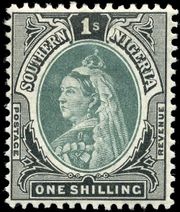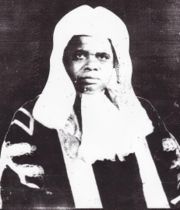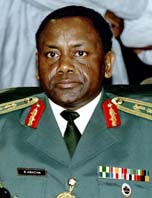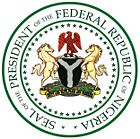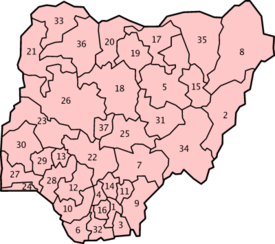Nigeria
From Roach Busters
(→Military era) |
|||
| Line 119: | Line 119: | ||
===Military era=== | ===Military era=== | ||
This disequilibrium and perceived corruption of the electoral and political process led in 1966 to several back-to-back coups. The subsequent political and social instability and chaotic, unpredictable climate scared away foreign investors, led to a suspension of foreign aid, polarized society, and had calamitous effects on the economy. An increasingly leftist trend in the upper echelons of the armed forces alarmed the United States and other Western countries, and in 1970 the pro-Western Lieutenant Colonel Yakubu Gowon seized power with CIA assistance. He immediately banned the Communist Party, severed ties with the Soviets, and opened the country to foreign investment. The economy grew healthily, but pervasive corruption meant that little of this newfound wealth trickled down to the populace, and public disenchantment with Gowon mounted. He was himself overthrown in 1973 and exiled to the United Kingdom. | This disequilibrium and perceived corruption of the electoral and political process led in 1966 to several back-to-back coups. The subsequent political and social instability and chaotic, unpredictable climate scared away foreign investors, led to a suspension of foreign aid, polarized society, and had calamitous effects on the economy. An increasingly leftist trend in the upper echelons of the armed forces alarmed the United States and other Western countries, and in 1970 the pro-Western Lieutenant Colonel Yakubu Gowon seized power with CIA assistance. He immediately banned the Communist Party, severed ties with the Soviets, and opened the country to foreign investment. The economy grew healthily, but pervasive corruption meant that little of this newfound wealth trickled down to the populace, and public disenchantment with Gowon mounted. He was himself overthrown in 1973 and exiled to the United Kingdom. | ||
| - | + | [[Image:Gowon.jpg|thumb|left|Lieutenant Colonel Yakubu Gowon served as President from 1970-1973.]] | |
His successor, the left-leaning General Tunji Sango, rapidly reversed course. The Soviet embassy was allowed to re-open, the Communist Party was legalized, the oil industry was nationalized, and several progressive, populist policies were introduced. While immensely popular with the masses, Sango was hated and feared by the country's elite, who openly advocated his overthrow. They got their wish, and in 1975 Sango was deposed and assassinated in a coup led by Murtala Mohammed. | His successor, the left-leaning General Tunji Sango, rapidly reversed course. The Soviet embassy was allowed to re-open, the Communist Party was legalized, the oil industry was nationalized, and several progressive, populist policies were introduced. While immensely popular with the masses, Sango was hated and feared by the country's elite, who openly advocated his overthrow. They got their wish, and in 1975 Sango was deposed and assassinated in a coup led by Murtala Mohammed. | ||
Revision as of 01:43, 5 June 2008
| Orílẹ̀-èdè Olómìnira Àpapọ̀ Naìjírìà Republik Nijeriya جمهورية نيجيريا Republic nde Naigeria Republik Federaal bu Niiseriya Federal Republic of Nigeria | |
| | |
 | 
|
| Flag | Coat of arms |
| | |
| Motto "Unity and Faith, Peace and Progress" | |
| | |
| Anthem Arise O Compatriots, Nigeria's Call Obey | |
| | |
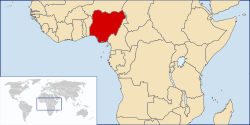
| |
| | |
| Capital (and largest city) | Lagos 6°27'11"N, 3°23′45″E |
| | |
| Official languages - Regional languages | English Hausa, Igbo, Yoruba, Fula |
| | |
| Demonym | Nigerian |
| | |
| Government - President - Vice President | Federal presidential republic (military dictatorship) Gen. Mohammed Abubakar Lt. Gen. Michael Ashimolowo |
| | |
| Independence - Declared and recognized - Republic declared | from the United Kingdom October 1, 1960 October 1, 1963 |
| | |
| Area - Total - Water (%) | 966,151 km² 373,031 sq mi 1.4 |
| | |
| Population - 2008 estimate - Density | 140,383,240 145.3 /km² 376.3 /sq mi |
| | |
| GDP (PPP) - Total - Per capita | 2008 estimate $833.315 billion $5,936 |
| | |
| GDP (nominal) - Total - Per capita | 2008 estimate $960.502 billion $6,842 |
| | |
| Gini (2004) | 63 (high) |
| | |
| HDI (2006) | |
| | |
| Currency | Nigerian naira (₦) (NGN)
|
| | |
| Time zone - Summer (DST) | IST (UTC +5:30) not observed (UTC +5:30) |
| | |
| Internet TLD | .ng |
| | |
| Calling code | +234 |
Nigeria, officially named the Federal Republic of Nigeria, is a federal republic comprising thirty-seven states. The country is located in West Africa and shares land borders with the Republic of Benin in the west, Chad and Cameroon in the east, and Niger in the north. Its coast lies on the Gulf of Guinea, part of the Atlantic Ocean, in the south. The capital city is Lagos.
The people of Nigeria have an extensive history, and archaeological evidence shows that human habitation of the area dates back to at least 9000 BC. The Benue-Cross River area is thought to be the original homeland of the Bantu migrants who spread across most of central and southern Africa in waves between the 1st millennium BC and the 2nd millennium AD.
With a population of almost 140 million, Nigeria is the most populous country in Africa and one of the ten most populous countries in the world. A middle-income country, its economy has flourished greatly for most of its history, due to massive reserves of petroleum and natural gas and prudent economic policies. However, corruption is rife, the gap between rich and poor is one of the largest in the world, and the country's poor human rights record has come under much scrutiny abroad.
Contents |
History
Early history
The Nok people in central Nigeria produced terracotta sculptures that have been discovered by archaeologists. A Nok sculpture resident at the Minneapolis Institute of Arts portrays a sitting dignitary wearing a "Shepherds Crook" on the right arm, and a "hinged flail" on the left. These are symbols of authority associated with Ancient Egyptian Pharaohs, and the god Osiris, and suggests that an ancient Egyptian style of social structure, and perhaps religion, existed in the area of modern Nigeria during the late Pharonic period. In the northern part of the country, Kano and Katsina has recorded history which dates back to around AD 999. Hausa kingdoms and the Kanem-Bornu Empire prospered as trade posts between North and West Africa.
The Yoruba people date their presence in the area of modern republics of Nigeria, Benin and Togo to about 8500 BC. The kingdoms of Ifẹ and Oyo in the western block of Nigeria became prominent about 700-900 and 1400 respectively. However, the Yoruba mythology believes that Ile-Ife is the source of the human race and that it predates any other civilization. Ifẹ produced the terra cotta and bronze heads, the Ọyọ extended as far as modern Togo. Another prominent kingdom in south western Nigeria was the Kingdom of Benin whose power lasted between the 15th and 19th century. Their dominance reached as far as the well known city of Eko which was named Lagos by the Portuguese traders and other early European settlers. In the 18th century, the Oyo and the Aro confederacy were responsible for most of the slaves exported from Nigeria.
The colonial era
Following the Napoleonic wars, the British expanded trade with the Nigerian interior. In 1885 British claims to a West African sphere of influence received international recognition and in the following year the Royal Niger Company was chartered under the leadership of Sir George Taubman Goldie. In 1900 the company's territory came under the control of the British Government, which moved to consolidate its hold over the area of modern Nigeria. On January 1, 1901 Nigeria became a British protectorate, part of the British Empire, the foremost world power at the time.
In 1914 the area was formally united as the Colony and Protectorate of Nigeria. Administratively Nigeria remained divided into the northern and southern provinces and Lagos colony. Western education and the development of a modern economy proceeded more rapidly in the south than in the north, with consequences felt in Nigeria's political life ever since. Following World War II, in response to the growth of Nigerian nationalism and demands for independence, successive constitutions legislated by the British government moved Nigeria toward self-government on a representative and increasingly federal basis. By the middle of the 20th century, the great wave for independence was sweeping across Africa.
Post-independence
On October 1, 1960, Nigeria gained its independence from the United Kingdom. The new republic incorporated a number of people with aspirations of their own sovereign nations. Newly independent Nigeria's government was a coalition of conservative parties: the Nigerian People's Congress (NPC), a party dominated by Northerners and those of the Islamic faith, and the Igbo and Christian dominated National Council of Nigeria and the Cameroons (NCNC) led by Nnamdi Azikiwe, who became Nigeria's maiden Governor-General in 1960. Forming the opposition was the comparatively liberal Action Group (AG), which was largely dominated by Yorubas and led by Obafemi Awolowo.
An imbalance was created in the polity by the result of the 1961 plebiscite. Southern Cameroon opted to join the Republic of Cameroon while northern Cameroon chose to remain in Nigeria. The northern part of the country was now far larger than the southern part. The nation parted with its British legacy in 1963 by declaring itself a Federal Republic, with Azikiwe as the first president. When elections came about in 1965, the AG was outmanoeuvred for control of Nigeria's Western Region by the Nigerian National Democratic Party, an amalgamation of conservative Yoruba elements backed heavily by the Federal Government amid dubious electoral circumstances. This left the Igbo NCNC to coalesce with the remnants of the AG in a weak progressive alliance.
Military era
This disequilibrium and perceived corruption of the electoral and political process led in 1966 to several back-to-back coups. The subsequent political and social instability and chaotic, unpredictable climate scared away foreign investors, led to a suspension of foreign aid, polarized society, and had calamitous effects on the economy. An increasingly leftist trend in the upper echelons of the armed forces alarmed the United States and other Western countries, and in 1970 the pro-Western Lieutenant Colonel Yakubu Gowon seized power with CIA assistance. He immediately banned the Communist Party, severed ties with the Soviets, and opened the country to foreign investment. The economy grew healthily, but pervasive corruption meant that little of this newfound wealth trickled down to the populace, and public disenchantment with Gowon mounted. He was himself overthrown in 1973 and exiled to the United Kingdom.
His successor, the left-leaning General Tunji Sango, rapidly reversed course. The Soviet embassy was allowed to re-open, the Communist Party was legalized, the oil industry was nationalized, and several progressive, populist policies were introduced. While immensely popular with the masses, Sango was hated and feared by the country's elite, who openly advocated his overthrow. They got their wish, and in 1975 Sango was deposed and assassinated in a coup led by Murtala Mohammed.
Mohammed made great strides in reducing corruption, while pursuing a neutral foreign policy and presiding over a mixed economy. However, after hinting at democratic reforms, military hard-liners removed him and put him under house arrest. A provisional junta ruled for three months before selecting General Owoye Azazi, a relative unknown, as Mohammed's replacement.
Unlike his predecessors, General Azazi possessed a remarkable political acuity and ability to survive. Between 1976 and 1979, he helped suppress no less than fourteen coup attempts, and purged the military of thousands of officers suspected of "disloyalty." He banned political parties, introduced strict censorship laws, implemented nationwide curfews, increased spending on defense and law enforcement, and dealt with both crime and dissent (though they were practically synonymous to him) ruthlessly. His regime is most remembered for its implementation of classically liberal and neo-liberal economic reforms, including the privatization of several state controlled industries and the rollback of many state welfare institutions. These policies were very successful in recovering economic growth (and are often called "the Miracle of Nigeria"), but they dramatically increased inequality, and some of their effects are sharply contested to this day. While millions of Nigerians were lifted out of poverty, life expectancy rose, and infant mortality fell, many of the poorer Nigerians plunged ever deeper into poverty, and the rising disparity in income and deteriorating living standards for the poor produced growing friction that made strikes, protests, and riots increasingly frequent. While Nigeria became a haven for foreign investment, it came at the price of social and political freedom; dissent continued to be brutally repressed. On a positive note, he won praise for stamping out tribalism and religious tension for the most part, even if this was accomplished through force.
By 1990, Nigeria had become a middle-income country with a relatively developed infrastructure, a large and educated middle-class, and fairly high (by Third World standards) living standards, but income inequality had soared to such unprecedented heights that even conservative allies of Azazi expressed alarm. Leftists called for a more equitable distribution of wealth; leftists and rightists alike called for democratization. To placate public opinion, Azazi restored parliament, grudgingly allowed token demonstrations, permitted mild criticism of the government, and lifted the ban on political parties. He decreed that two political parties could exist, one "a little to the left," the other "a little to the right." The newly created parties, the Social Democratic Party and the National Republican Convention, were overwhelmingly comprised of Azazi loyalists. Both parties were forced to strictly adhere to centrist manifestoes and shun "extremism, polarization, tribalism, religious insensitivity, excess politicization, and anti-populace tendencies." Parliamentary elections were scheduled for 1993, but Azazi died before they could be held. His successor, General Mohammed Abubakar, allowed them to proceed.
A hard-liner, Abubakar reversed some of Azazi's more liberal policies and repressed dissent even more forcefully than his predecessor. More controversially, he introduced the death penalty for homosexuality, and declared a "national crusade" against homosexuals. Yet, he managed to avoid discontent by sating the populace with subsidized gasoline, free healthcare and education, and low-cost housing units for the poor. Nevertheless, his commitment to market economics was as strong as Azari's had been, and he repeatedly assured foreign investors they had nothing to fear from it, and proved it by doing away with nearly all of Nigeria's (precious few) economic regulations.
As of 2008, Nigeria's economy has continued to grow healthily, yet there are also issues of growing concern. Increasing scrutiny from human rights organizations and foreign governments, re-emergent class tensions, steadily rising crime rates, declining standards in education and health, and a low-scale insurgency in the oil-rich Niger Delta are among the difficulties Nigeria faces today. How well it can weather them and continue to advance as a nation, and whether democracy will ever come or not, remains to be seen.
Government and politics
Nigeria is a federal republic organizationally modelled after the United States, with executive power exercised by the president and with overtones of the Westminster System model in the composition and management of the upper and lower houses of the bicameral legislature.
The current president of Nigeria is General Mohammed Abubakar, who succeeded General Owoye Azazi upon the latter's death in 1993. The president presides as both chief of state and head of government. While the constitution stipulates that the president is to be elected by popular vote and be limited to a maximum of two four-year terms, this provision has been ignored by Nigeria's military rulers for decades.
The president's power is checked, at least on paper, by a Senate and a House of Representatives, which are combined in a bicameral body called the National Assembly; in reality, this body rarely provides even token opposition, and is largely filled by yes-men whose only purposes are to provide an illusion of democratic governance and approve the president's initiatives. The Senate is an 111-seat body with three members from each state; members are elected by state legislatures to four-year terms. The House contains 360 seats and the number of seats per state is determined by population.
Only two political parties are legal and allowed to hold office, the centrist Social Democratic Party and National Republican Convention, the former leaning "a little to the left," and the latter "a little to the right." Both parties' platforms were written by the military government, and both parties are forced to toe the government line, and forbidden from propagating "seditious, anti-family, anti-religion, or anti-government beliefs." Tribalism, once rampant in Nigerian politics and society, has been all but extinguished; political office holders have lost their seats or even been thrown in prison on the flimsiest evidence of holding "tribal tendencies."
Corruption, vote rigging, and other means of coercion, including open ballots and the presence of security officers at polling places, make a mockery of Nigerian "democracy."
Cabinet
| Office | Name |
|---|---|
| Minister of Agriculture | Lt. Gen. Bayo Audu |
| Minister of Commerce and Industry | Gen. Iyabo Obasanjo |
| Minister of Education | Maj. Gen. Ishaya Dantata |
| Minister of Finance | Gen. Abdullahi Abacha |
| Minister of Foreign Affairs | Lt. Gen. Chinua Okadigbo |
| Minister of Infrastructure | Maj. Gen. Ebuka Azikiwe |
| Minister of Interior | Gen. Obafemi Johnson |
| Minister of Justice and Public Security | Lt. Gen. Mohammed Aguiyi |
| Minister of Labor | Maj. Gen. Nwafor Ekwensi |
| Minister of National Defense | Gen. Adekunle Bakare |
| Minister of Petroleum | Gen. Onyema Iguodala |
| Minister of Transportation | Lt. Gen. Hassan Ironsi |
Law
There are three distinct systems of law in Nigeria:
- English Law which is derived from its colonial past with Britain;
- common law, a development of its post colonial independence;
- customary law, which is derived from indigenous traditional norms and practice
The country has a judicial branch, the highest court of which is the Supreme Court of Nigeria. The courts are dominated by politically reliable appointees chosen for sycophany rather than merit.
